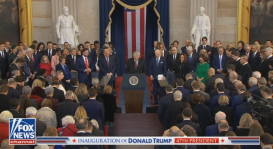
In response to the attempts of an atheist group to remove the phrase "In God We Trust" from American currency, the Rev. Franklin Graham has warned that terrible things happen to nations and people who turn their backs on the protective hand of God.
On Friday, the 64-year-old evangelist took to Facebook to share his thoughts: "An atheist group is trying to sue the U.S. government to remove 'In God We Trust' from our money. Not a smart move," he wrote. "I wonder if these people realize just what can and will happen to a nation - and a people - who want nothing to do with Almighty God or His hand of protection?"
He added, "President Dwight D. Eisenhower must have known. The words were first added to U.S. coins during the beginning of the Civil War, but on July 30, 1956, President Eisenhower signed a law officially declaring: 'In God We Trust' to be America's official motto. There isn't a better one."
As reported by The Gospel Herald, Michael Newdow, an atheist activist and ordained minister of the Universal Life Church, and 41 other plaintiffs are pursuing legal action for the second time to have the iconic motto removed from currency.
The complaint, which was filed in Akron, Ohio, reads in part: "It [the motto] violates the first ten words of the Bill of Rights ('Congress shall make no law respecting an establishment of religion'), and it violates the Religious Freedom Restoration Act (RFRA). Unfortunately, because Constitutional principles can be twisted and perverted, the challenges to this practice under the Establishment Clause have, so far, failed."
Newdow's lawsuit, which is 112 pages in length, refers to God as "G-d" throughout, and makes the claim that the presence of the motto on coins and dollars offers an unfair advantage to Christians.
He later told ThinkProgress that he believes the Religious Freedom Restoration Act may help atheists win the case to have the motto removed, because the Act states there must be compelling government interest for including "God" on something, such as money.
"Imagine if Christians had to carry on their body something they disagree with religiously, like 'Jesus is a lie' -- how long do you think that would stand?" he said, arguing that there is no "compelling government interest" in his case.
"But atheists are so denigrated in this society that people accept this without a second thought."
He added that many people who find the presence of the theistic phrase "offensive" and "unlawful."
This is not the first time Newdow has sought the removal of Christianity from public view: He previously pursued getting the current version of the Pledge of Allegiance in U.S. public schools declared unconstitutional because it includes the phrase "under God."
Later, he filed and lost a lawsuit to stop the invocation prayer at President George Bush's second inauguration, and in 2009, he filed a lawsuit to prevent references to God and religion from being part of President Barack Obama's inauguration.
In concluding his Facebook post, Graham wrote, "Should a handful of people-41 atheists in this case-be able to change what has been the backbone of a nation for generations? I certainly hope not. The Bible says, 'Some trust in chariots and some in horses, but we trust in the name of the Lord our God' (Psalm 20:7)."







